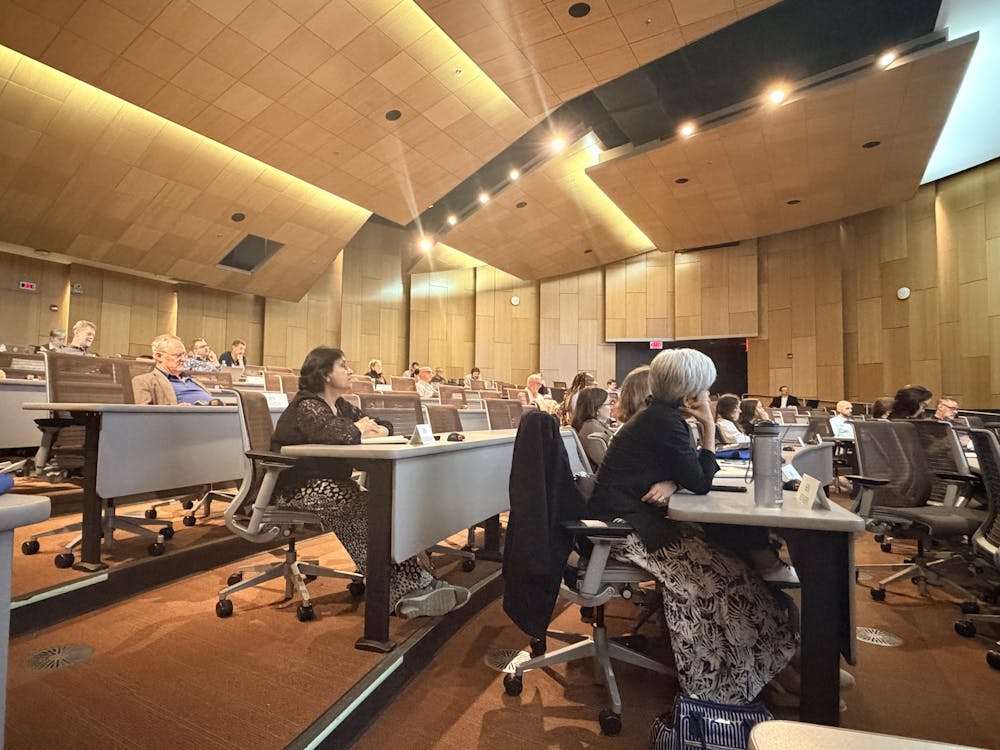Faculty expresses concerns about new general education program proposal
Faculty members expressed their concerns regarding the new general education plan that Central Michigan University is developing for its students.
The faculty discussed the general education proposal at the Oct. 14 Academic Senate meeting. They said they were mainly concerned about new writing-intensive courses, lack of bias and discrimination course requirements and the impact that artificial intelligence may have on this new program.
Joshua Smith, interim general education coordinator, said that there is nothing inherently wrong with the current program. Its reconsideration is simply one of many moving factors of the university's accreditation cycle.
“A gen-ed program is supposed to give you a broad base so that no matter what you do, you've got a set of skills and a knowledge base that are going to help you succeed,” Smith said. “Our gen-ed program does a good job of that."
The possible revisions would target the clarity and shortfalls of the current plan. As of now, Smith said, students find the general education program hard to navigate. University faculty, staff and administration think it is lacking in different areas that would better prepare students to succeed post-graduation.
“The new proposal is much, much cleaner,” Smith said. “It eliminates any kind of efficiency considerations. It's just, look, here's what you need to do.”
Smith said that, along with changes that would simplify the plan, the university plans to establish a “running thread” of connected learning outcomes. The established themes would target soft skills, such as critical thinking and developing lifelong learning habits.
The burden of making these changes, Smith said, will fall on faculty.
“Faculty are going to have a fair deal of work to do because what makes a particular course at CMU is what we call a master course syllabus,” Smith said. “Those go through a curricular process to get approved, and they're all going to have to be changed because part of what defines a course are those learning outcomes.
"And if we say, okay, in order for your course to count this way, they're going to have to be changed to make sure that the course is appropriate for whatever gen-ed program comes out.”
Before the faculty gets involved, the new framework must be approved by the Academic Senate. The administration and Academic Senate will then collaborate to establish possible budget ramifications and consider faculty-submitted courses for approval under the new plan.
As part of the Academic Senate discussion, professors like Heather Kendrick spoke about some of the proposed changes to the general education program.
Kendrick, a faculty member in the Department of Philosophy, spoke out about the new Writing to Learn requirement, which is replacing the current Writing Intensive requirement by increasing the amount of writing.
"The writing to learn requirement greatly increases the work that a writing-intensive class will require. It demands that both the exams include writing and 50% of the rest of the course, right, also be based on writing," Kendrick said.
Rachael Nelson of the Department of Health Sciences expressed her concerns that students are no longer required to take courses in Bias and Discrimination.
"My concern is that is for students who are not actively seeking it out, or even more so, for students not who do not want to learn about it, they can easily avoid it altogether,” said Nelson.
Kendrick continued by discussing her concerns regarding the use of Generative AI by students under these new requirements.
“It is extremely difficult to successfully demonstrate that a student has used generative AI in the case of a grade appeal," Kendrick said. "Generative AI is getting better at doing things that it was previously thought to be weak on. It can even produce successful drafts."
The Senate will vote on moving the proposal forward at the next meeting on Oct. 28, but the process of developing the plan within the framework is long. At the earliest, the new plan will begin to impact students enrolling in 2029, Smith said.
Current students and students who enroll before the plan is finalized will not be impacted. When the new program is approved, students who are enrolled under the current program will have the option of moving to the new one.
Changing the gen-ed program, Smith said, poses little risk to students.
“We’ve done this before,” Smith said. “We know how to do it. It'll just be a little bit tricky making sure we get the students who want to change get credit for the work they've done. For current students, it's important to remember the current gen-ed program serves them well. They really don't need to worry about it.”




